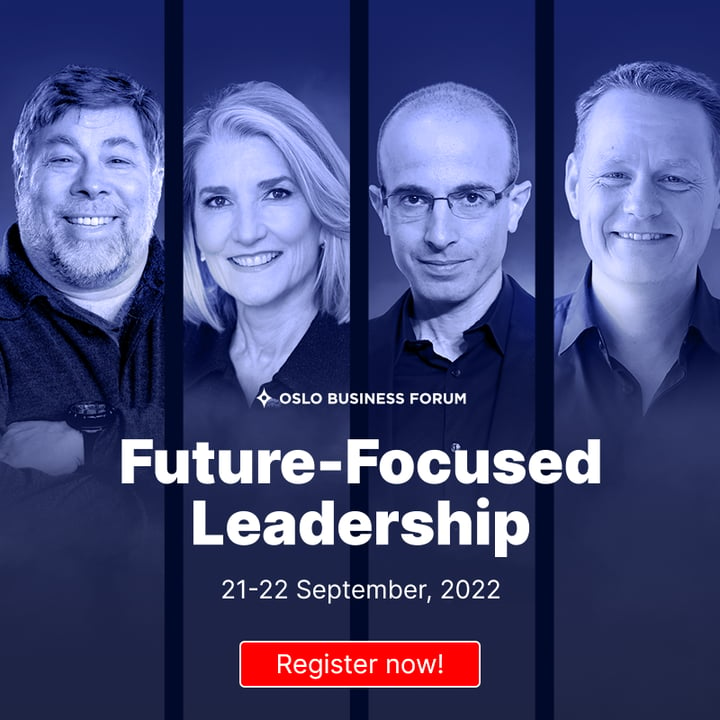On 29 September, we joined forces with Nordic Business Forum to organize a hybrid event focusing on rethinking business. Over the course of the day, 6 leading experts provided their insights on the topic.
Later, we will publish a thorough summary of each session, but here, we list one key leadership lesson from each speaker.
Stéphane Garelli: Get Your Timing Right
“It’s not only about if it is right, but about when it is right.”
Stéphane gave a couple of examples to highlight his point. He reminded us about Laker Airways—the first low-cost airline that was established in 1978. And yes, you guessed it: it failed. Another product that was launched at the wrong time was Newton (a personal digital agenda) by Apple in 1993. This product launch was almost the end of Apple. “Now, both of these are part of our daily lives.”
So, according to Stéphane, “timing is everything”.
Alex Osterwalder: Spend Enough Time on Innovation
How much time should a CEO spend on innovation? That was the question Alex asked the crowd at the conference. For some, it might sound unexpected, that according to Alex, a CEO should spend at least 20-40% of their weekly working time focusing on innovation.
“For all the leaders in the room, if you’re not spending 20-40% of your time on innovation, it’s not going to happen.” He mentioned that if a CEO spends all of their time on the operational part of the role, you might end up having amazing operations but your organization is not going to innovate.
“At least just show you’re invested in innovation because the symbolic value of seeing that the leadership is interested in innovation will have a ripple effect.”
Jitske Kramer: Have Campfire Conversations with Your Team
There are many things that shape our cultures but Jitske underlined that one of the most important ones is interaction. “We have numerous ways of interacting and the two main ones are: transactional interaction and transformational interactions.”
Jitske refers to these in the organizational context as “bullet point meetings” and “campfire conversations”. Bullet point meetings are transactional as in those we organize the ordinary world efficiently. But campfire conversations are the moments you engage in a more deed and transformational conversation with your team. “It’s at those moments that we shape our cultures.”
Especially now, leaders should focus on creating the space, time, and routines for campfire conversation in the context of hybrid work. According to Jitkse, during the pandemic in the remote and hybrid setting, many organizations have been able to pull off great bullet point meetings, but the number of great campfire conversations has been close to zero.
Are you having enough campfire conversations in your organization?
Erin Meyer: Focus on Increasing Candor
During her keynote, Erin shared with us the key ingredients of the successful Netflix culture. One of the main issues she highlighted was the importance of open feedback and candor in an organization.
“Create a culture wherein your organization feedback is frequently on the agenda.” Practically, this means that you make feedback discussions a frequent and regular practice in your organization.
She also provided a model of 4 As to help you get started:
- Aim to assist
- Actionable
- Appreciate
- Accept or decline
She then encouraged all the leaders in the room to “give feedback anytime, anywhere”.
Rachel Botsman: Create Trust through Integrity
When talking about trust, there were actually four trust traits that Rachel introduced to us based on her research. The most important trait of those according to Rachel is integrity. “When you look at trust crisis in the world today, whether that’s what’s going on at Facebook, financial scandals, political scandals, whatever it may be, the root cause often comes back to integrity.”
The way Rachel approaches integrity is that at its core it’s really about alignment. “It’s about believing that this person’s intentions and motives are aligned with ours.” She explained that the question of integrity and alignment can be seen, for example when a company’s business model is not being aligned with our interest, or when a politician’s intentions are not aligned with our best interests.
And why is integrity so important for leaders (and anyone else for that matter)? It’s because if you have a trust crisis due to integrity issues, it will be very difficult for you to come back from that.
Nicolai Tangen: Show Your Uncertainty as a Leader
Coming from a person who runs the Norwegian Oil Fund (that holds 1.4% of all of the world’s listed companies), the emphasis for leaders to show vulnerability and uncertainty might be a bit surprising.
In their conversation with Rachel, the two spoke about how it can be tempting for leaders to always give answers—even to questions they don’t have accurate responses to. Rachel also mentioned that this can in fact be an irresponsible thing for a leader to do. Nicolai agreed and emphasized that he believes that strong leaders are the ones who communicate honestly and show their uncertainty. “Being able to show people that you don’t know is a real strength.”
Even though as a leader you might feel the pressure to always give answers, according to Nicolai it’s important to never fall prey to this. If you’re not sure about the answer, it’s better to admit that or you might lose your credibility as a leader.
Right now, we have early bird tickets to Oslo Business Forum 2022: Future-Focused Leadership. Register now to get it for discounted tickets!